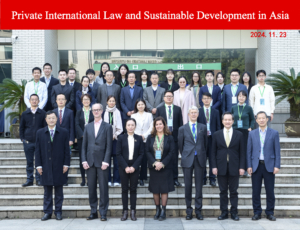Views
Anti-enforcement injunction granted by the New Zealand court
For litigants embroiled in cross-border litigation, the anti-suit injunction has become a staple in the conflict of laws arsenal of common law courts. Its purpose being to restrain a party from instituting or prosecuting proceedings in a foreign country, it is regularly granted to uphold arbitration or choice of court agreements, to stop vexatious or oppressive proceedings, or to protect the jurisdiction of the forum court. However, what is a party to do if the foreign proceeding has already run its course and resulted in an unfavourable judgment? Enter the anti-enforcement injunction, which, as the name suggests, seeks to restrain a party from enforcing a foreign judgment, including, potentially, in the country of judgment.
Decisions granting an anti-enforcement injunction are “few and far between” (Ecobank Transnational Inc v Tanoh [2015] EWCA Civ 1309, [2016] 1 WLR 2231, [118]). Lawrence Collins LJ (as he then was) described it as “a very serious matter for the English court to grant an injunction to restrain enforcement in a foreign country of a judgment of a court of that country” (Masri v Consolidated Contractors International (UK) Ltd (No. 3) [2008] EWCA Civ 625, [2009] QB 503 at [93]). There must be a good reason why the applicant did not take action earlier, to prevent the plaintiff from obtaining the judgment in the first place. The typical scenario is where an applicant seeks to restrain enforcement of a foreign judgment that has been obtained by fraud.
This was the scenario facing the New Zealand High Court in the recent case of Kea Investments Ltd v Wikeley Family Trustee Limited [2022] NZHC 2881. The Court granted an (interim) anti-enforcement injunction in relation to a default judgment worth USD136,290,994 obtained in Kentucky (note that the order was made last year but the judgment has only now been released). The decision is noteworthy not only because anti-enforcement injunctions are rarely granted, but also because the injunction was granted in circumstances where the foreign proceeding was not also brought in breach of a jurisdiction agreement. Previously, the only example of a court having granted an injunction in the absence of a breach of a jurisdiction agreement was the case of SAS Institute Inc v World Programming Ltd [2020] EWCA Civ 599 (see Tiong Min Yeo “Foreign Judgments and Contracts: The Anti-Enforcement Injunction” in Andrew Dickinson and Edwin Peel A Conflict of Laws Companion – Essays in Honour of Adrian Briggs (OUP, 2021) 254).
Kea Investments Ltd v Wikeley Family Trustee Limited involves allegations of “a massive global fraud” perpetrated by the defendants – a New Zealand company (Wikeley Family Trustee Ltd), an Australian resident with a long business history in New Zealand (Mr Kenneth Wikeley), and a New Zealand citizen (Mr Eric Watson) – against the plaintiff, Kea Investments Ltd (Kea), a British Virgin Islands company. Kea alleges that the US default judgment is based on fabricated claims intended to defraud Kea. Its substantive proceeding claims tortious conspiracy and a declaration that the Kentucky judgment is not recognised or enforceable in New Zealand. Applying for an interim injunction, the plaintiff argued that “the New Zealand Court should exercise its equitable jurisdiction now to prevent a New Zealand company … from continuing to perpetrate a serious and massive fraud on Kea” (at [27]) by restraining the defendants from enforcing the US judgment.
The judgment is illustrative of the kind of cross-border fraud that private international law struggles to deal with effectively: here, alleged fraudsters using the Kentucky court to obtain an illegitimate judgment and, apparently, frustrate the plaintiff’s own enforcement of an earlier (English) judgment, in circumstances where the Kentucky court is unwilling (or unable?) to intervene because Kea was properly served with the proceeding in BVI.
Gault J considered that the case was “very unusual” (at [68]). Kea had no connection to Kentucky, except for the defendants’ allegedly fabricated claim involving an agreement with a US choice of court agreement and a selection of the law of Kentucky. Kea also did not receive actual notice of the Kentucky proceedings until after the default judgement was obtained (at [73]). In these circumstances, the defendants were arguably “abusing the process of the Kentucky Court to perpetuate a fraud”, with the result that “the New Zealand Court’s intervention to restrain that New Zealand company may even be seen as consistent with the requirement of comity” (at [68]).
One may wonder whether the Kentucky Court agrees with this assessment – that a foreign court’s injunction restraining enforcement of its judgment effectively amounts to an act of comity. In fact, Kea had originally advanced a cause of action for abuse of process, claiming that the alleged fraud was an abuse of process of the Kentucky Court. It later dropped the claim, presumably due to a recent English High Court decision (W Nagel (a firm) v Chaim Pluczenik [2022] EWHC 1714) concluding that the tort of abuse of process does not extend to foreign proceedings (at [96]). The English Court said that extending the tort to foreign proceedings “would be out of step with [its] ethos”, which is “the Court’s control of its own powers and resources” (at [97]). It was not for the English court “to police or to second guess the use of courts of or law in foreign jurisdictions” (at [97]).
Since Gault J’s decision granting interim relief, the defendants have protested the Court’s jurisdiction, arguing that Kea is bound by a US jurisdiction clause and that New Zealand is not the appropriate forum to determine Kea’s claims. The Court has set aside the protest to jurisdiction (Kea Investments Ltd v Wikeley Family Trustee Limited [2023] NZHC 466). The Court also ordered that the interim orders continue, although the Court was not prepared to make a further order that the defendants consent to the discharge of the default judgment and withdraw their Kentucky proceedings. This, Gault J thought, was “a bridge too far” at this interim stage (at [98]).
Of Hints, Cheats, and Walkthroughs – The Australian Consumer Law, The Digital Economy, and International Trade
By Dr Benjamin Hayward
Those who enjoy playing video games as a pastime (though certainly not in the competitive esports environment) might take advantage of different forms of assistance when they find themselves stuck. Once upon a time, they might have read up on tips and tricks printed in a physical video game magazine. These days, they are more likely to head online for help. They might seek out hints – tidbits of information that help point the gamer in the right direction, but that still allow them to otherwise work out a solution on their own. They might use cheats – which allow the gamer ‘to create an advantage beyond normal gameplay’. Otherwise, they might use a walkthrough – which, as the name suggests, might walk a player through the requirements of perhaps even ‘an entire video game’.
Despite initial appearances, these definitions do more than just tell us about recreation in general, and gaming culture in particular. They also help us understand the state of play in relation to the Australian Consumer Law’s application to the digital economy, and, in turn, the ACL’s implications for international digital economy trade.
This video game analogy is actually very apt: gaming set the scene for recent litigation confirming the ACL’s application to off-shore video game vendors. In the Valve case concerning the Steam computer gaming platform, decisions of the Federal Court of Australia and (on appeal) its Full Court confirmed that reach, via interpretation of the ACL’s s 67 conflict of laws provision. The High Court of Australia denied special leave for any further appeal. In the subsequent Sony Europe case, concerning the PlayStation Network, liability was not contested. On the other hand, there was a live issue in Valve – at least at first instance – as to whether or not video games constitute ‘goods’ for the purposes of the ACL’s consumer guarantees. The ACL’s statutory definition of goods includes ‘computer software’. Expert evidence, not contested and accepted by the Federal Court, treated computer software as equivalent to executable files; which may work with reference to non-executable data, which is not computer software in and of itself.
Understanding the ACL’s definition of ‘goods’ has significant implications. The ‘goods’ concept is a gateway criterion: it determines whether or not the ACL’s consumer guarantees apply, and in turn, whether it is possible to mislead consumers about the existence of associated rights. So far as digital economy trade is concerned, case law addressing Australia’s regular Sale of Goods Acts confirms that purely-digital equivalents to traditional physical goods are not ‘goods’ at common law. Any change to this position, according to the New South Wales Supreme Court, requires statutory intervention. Such intervention did occur when the Trade Practices Act 1974 (Cth) transitioned into the Competition and Consumer Act 2010 (Cth). Now, ‘computer software’ constitutes a statutory extension to the common law definition of ‘goods’ that would otherwise apply.
It is against all this context that a very recent decision of the Federal Court of Australia – ACCC v Booktopia Pty Ltd [2023] FCA 194 – is of quite some interest. Whilst most of the decision is uncontroversial, one aspect stands out: the Court held, consistently with Booktopia’s admission, that eBooks fall within the scope of the ACL’s consumer guarantee protections. This finding contributed to an AUD $6 million civil pecuniary penalty being imposed upon Booktopia for a range of breaches of the ACL. But is it actually correct? Whether or not that is so depends upon whether the statutory phrase ‘computer software’ extends to digital artefacts other than traditional desktop computer programs. There is actually good reason, based upon the expert evidence tendered and accepted in the Valve litigation, to think not.
So what does the Booktopia case represent? It could be a hint – an indication that will eventually lead us to a fully-explained understanding of the ACL’s wide reach across the digital economy. In this sense, it might be a pointer that helps us to eventually solve this interpretative problem on our own. Or it could be a cheat – a conclusion possibly justified in the context of this individual case given Booktopia’s admissions, but not generalisable to the ACL’s normal operation. Either way, given the ACCC’s expressed view (not necessarily supported by the ACL’s actual text) that ‘[c]onsumers who buy digital products … have the same rights as those who shop in physical stores’, what we really need now is a walkthrough: a clear and reasoned explanation of exactly what ‘computer software’ actually means for the purposes of the ACL. This will ensure that traders have the capacity to know their legal obligations, and will also allow Parliament to extend the ACL’s digital economy protections if its reach is actually limited in the way that my own scholarship suggests.
All of this has significant implications for international trade, as ‘many transfers’ of digital assets ‘are made between participants internationally’. The increasing internationalisation and digitalisation of trade makes it imperative that this ambiguity be resolved at the earliest possible opportunity. Since, in the words of the Booktopia judgment, ACL penalties ‘must be of an appropriate amount to ensure that [their] payment is not simply seen as a cost of doing business’, traders – including international traders – do need to know with certainty whether or not they are subject to its consumer protection regime.
Dr Benjamin Hayward
Senior Lecturer, Department of Business Law and Taxation, Monash Business School
Twitter: @LawGuyPI
International Trade and International Commercial Law research group: @MonashITICL
The Fourth Private International Law Conference for Young Scholars in Vienna
Written by Alessa Karlinski and Maren Vogel (both Free University Berlin).
On February 23rd and 24th, 2023, young scholars came together at the Sigmund Freud University, Vienna, to discuss different views on private international law under the theme of “Deference to the foreign – empty phrase or guiding principle of private international law?”. Continuing the success of the previous three German-Speaking Conferences of Young Scholars in PIL from previous years in Bonn, Würzburg and Hamburg, this year’s conference was hosted in Austria by Martina Melcher and Florian Heindler who organized the event together with Andreas Engel, Katharina Kaesling, Ben Köhler, Bettina Rentsch, Susanna Roßbach and Johannes Ungerer. Read more
News
Report on the launch event of the Australasian Association of Private International Law
On Thursday 5 December 2024, a group of private international lawyers gathered in Melbourne and online for the launch of the Australasian Association of Private International Law (AAPrIL).
AAPrIL was founded in 2024 by lawyers and academics in Australia and New Zealand who are engaged in private international law. AAPrIL’s aim is to bring together people committed to furthering understanding of private international law in Australia, New Zealand and the Pacific region.
The launch was held at the offices of Corrs Chambers Westgarth in Melbourne. After networking and drinks, the formalities were opened by Cara North, Corrs Special Counsel and AAPrIL Treasurer, who would be known to many following the blog for her work on the HCCH Judgments Project. Cara introduced Jack Wass, New Zealand barrister and AAPRIL’s New Zealand Vice-President, who is co-author of The Conflict of Laws in New Zealand and who was Master of Ceremonies.
The event featured addresses from two of the most influential lawyers in private international law issues from either side of the Tasman Sea.
The Honourable Dr Andrew Bell, Chief Justice of New South Wales, gave a comprehensive pre-recorded address, speaking to the importance of the discipline and the growing number of judgments dealing with cross-border issues in Australia. His Honour has been deeply engaged in private international law for decades; he his author of Forum Shopping and Venue in Transnational Litigation and a co-author of Nygh’s Conflict of Laws in Australia, and acted as counsel in many of Australia’s most significant private international law cases until his appointment to the New South Wales Supreme Court. Chief Justice Bell is the inaugural Patron of AAPrIL.
The Honourable David Goddard, Judge of the Court of Appeal of New Zealand, then delivered a live online address that also spoke to the importance of the discipline. His Honour advocated for the continued modernisation of domestic laws to harmonise approaches to private international law problems between legal systems, encouraging governments to adopt instruments of the Hague Conference on Private International Law (HCCH). Justice Goddard is perfectly placed to speak to the subject: he was the Chair of the Diplomatic Session of the HCCH that adopted the 2019 HCCH Judgments Convention, Vice-President of the Diplomatic Session that adopted the 2005 Choice of Court Convention, and a member of the drafting committee for that Convention. Read more
Private International Law and Sustainable Development in Asia at Wuhan University – Report
By Zixuan Yang, a PhD student at Max Planck Institute for Comparative and International Private Law in Hamburg, Germany.
The Conference on Private International Law and Sustainable Development in Asia was successfully held at Wuhan University School of Law on 23rd November 2024. This international symposium was organized by Wuhan University Academy of International Law and Global Governance, Wuhan University School of Law and China Society of Private International Law. Following a Call for Papers of the Chinese Journal of Transnational Law (CJTL), the symposium provided an ideal platform for participants to critically and constructively engage with the functions, methodologies and techniques of private international law in relation to sustainable development from the Asian perspective. Distinguished legal experts and scholars from Japan, India, Vietnam, Singapore, Hong Kong SAR, Macao SAR, Taiwan, Mainland China, Germany and the Netherlands delivered presentations and participated in discussions on-site and online.

After Professor Zheng Tang opened the conference, vice President of the China Law Society, President of the China Society of International Law and President of the China Society of Private International Law, offered a welcome. This was followed by a joint keynote speech from Professor Ralf Michaels (Max Planck Institute for Comparative and International Private Law, Hamburg), Professor Verónica Ruiz Abou-Nigm (University of Edinburgh), and Hans van Loon (former Secretary-General of the Hague Conference on Private International Law) on Private International Law and SDGs 2030. Together with Zheng Tang, they will serve as special editors of an issue in CJTL that brings the papers together. Read more
Report on the 2024 Asia-Pacific Colloquium of the Journal of Private International Law (JPIL)
On 5–6 December 2024, 18 private international lawyers from Australia, Hong Kong, Japan, New Zealand and Singapore came together at the University of Melbourne for the 2024 Asia-Pacific Colloquium of the Journal of Private International Law (JPIL).
The colloquium was the first since 2018, when it had been held in Japan. The 2024 event was expertly hosted by Professor Richard Garnett and Professor Ying Khai Liew of the University of Melbourne Law School, and held at University House at UniMelb’s Parkville campus. Read more




